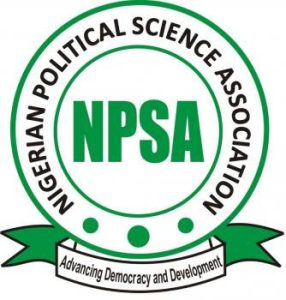The Nigerian Political Science Association (NPSA) says Nigeria is down because it is operating liberal democracy that is unsuitable due to its underlying economic philosophy which the country lacks the infrastructure to support.

Puts its foot down at last
The NPSA said in a statement signed by Prof Hassan A. Saliu, its president, that uncritical consumption of neo-liberal economic prescriptions, the rent seeking and unpatriotic predilections of the elite and the degree of poverty issuing from their lack of vision are at the roots of the country’s decay.
It remains to be seen how Nigerians and the world will react to the arguably most categorical and most radical declaration by the platform of political scientists in Nigeria in the statement titled Making Democracy Work for Nigerians.
Intervention can speculate that it will not be surprising if the frame game turns into a game changer towards refining Nigeria’s democracy and democratic practices. After all, the platform is the most concentrated of those who hold the conceptual ace in matters political.
The statement which came with a package of suggestions on course correction runs in full as follows:
The Nigerian nation is undoubtedly experiencing its most challenging period since gaining independence in 1960. Every sector, including security, economy, national integration, and external relations, is struggling. Successive governments have made promises, but the reality is that poverty and other worries dominate daily life. Consequently, the people have lost faith in their governments.
As an Association, we have not remained silent about the deteriorating conditions. In April 2024, we released a statement on the hardship being faced by Nigerians and offered suggestions for improvement. We have since followed up with two more releases in August on the state of the nation. Unfortunately, our concerns seem to have fallen on deaf ears, reflecting the typical governance dynamics in Africa.
Nigerians are divided on how the country reached this low point. However, the Nigerian Political Science Association (NPSA) has identified four fundamental issues that require urgent attention:
(1) The democratic system: Nigeria’s liberal democracy is unsuitable due to its underlying economic philosophy, which the country lacks the infrastructure to support.
(2) Uncritical consumption of neo-liberal economic prescriptions.
(3) Political elites: Unlike their Southeast Asian counterparts, Nigeria’s leaders prioritize rent-seeking over patriotism and nationalism, pillaging resources without regard for the nation’s well-being.
(4) Lack of humanity: Leaders live luxuriously amidst widespread poverty, demonstrating a lack of vision and progressive national consensus.
In our opinion, Nigeria is not difficult to govern, but its elites are the problem due to their tendency for exclusivity. We are almost in a desperate situation, judging by the high rise in the cost of living, which requires the political class to adopt patriotism and nationalism, relinquish entitlement, and embrace values aligned with the nation’s mood.
Moreover, Nigeria’s democracy, in its current form, cannot deliver. Liberal democracy is already stressed globally, and Nigeria’s unique challenges make it more unworkable. Embracing affordability and limiting privileges for public office holders can redirect the nation’s affairs.
We urge Nigerians to:
– Reassess the democratic system to suit Nigeria’s context.
– Foster patriotism and nationalism among leaders.
– Prioritize affordability and prudent resource management.
– Limit privileges for public office holders.
– Be more sensitive to the plight of citizens
– Address the root causes of poverty.
– Come to terms with the excruciating economic conditions.
– Avoid propaganda or the usual refrain of ‘we know you are suffering’ and work for sustainable immediate deliverables.
– Admit that the palliative regime is not working, and the street economics is scary in its revelations.
To achieve all these, we recommend the following:
(1) Constitutional reforms: Review the constitution to address structural flaws hindering effective governance.
(2) Change the mindset of leaders to foster a culture of accountability, transparency, and patriotism.
(3) Work out short-term economic solutions to change the economic climate for the better.
(4) Economic restructuring/diversification: Implement policies promoting economic growth, job creation, and poverty reduction.
(5) National integration: Encourage inclusive governance, dialogue, and reconciliation to address ethnic and religious tensions.
(6) Institutional reforms: Strengthen institutions to ensure independence, efficiency, and effectiveness.
(7) Civic engagement: Promote a healthy government-citizen relationship
(8) Seeking genuine international cooperation: Engage with international partners to access expertise, resources, and support from the angle of what is good for Nigerians.
(9) Initiate the process for the adoption of another form of democracy that does not distribute poverty indiscriminately and serves the people.
By implementing all these measures, Nigeria can overcome its current challenges and emerge stronger, more united, and prosperous nation.





























1 Comments
Rasheed Akinkuolie
The problem of Nigeria is the Unitary system. The country is too diversified and unwieldy to be ruled centrally. Nigeria worked superbly well during the period of regionalism.